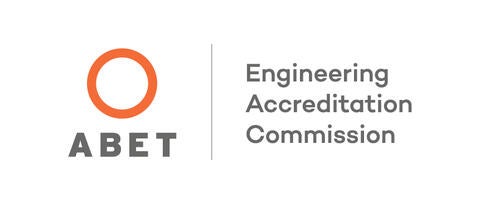ABET
Chemical Engineering
The Bachelor of Science in Chemical Engineering (CHE) Program is accredited by the Engineering Accreditation Commission (EAC) of ABET http://www.abet.org/, under the commission's General Criteria and Program Criteria for Chemical, Biochemical, Biomolecular, and Similarly Named Engineering Programs.
We have a continuous improvement process in place within the Department to ensure compliance with ABET requirements. This process is overseen by the Undergraduate Committee Chair, assisted by the Chemical and Environmental Engineering staff. We regularly collect quantitative metrics for all our courses to ensure that the program outcomes and educational objectives are met. In addition, we collect regular inputs from the Industrial Advisory Board, students, faculty and alumni to continuously evaluate, update and improve the objectives.
Chemical Engineering Program Educational Objectives
Graduates who will attain high levels of technical expertise to enable their achievement in diverse chemical engineering practice and research, or in allied careers, be prepared for graduate level education, and become successful members of the professional community, for the benefit of our constituents.
Chemical Engineering Student Outcomes
"Skills, knowledge, and behaviors" acquired by the time of graduation:
- an ability to identify, formulate, and solve complex engineering problems by applying principles of engineering, science, and mathematics
- an ability to apply engineering design to produce solutions that meet specified needs with consideration of public health, safety, and welfare, as well as global, cultural, social, environmental, and economic factors
- an ability to communicate effectively with a range of audiences
- an ability to recognize ethical and professional responsibilities in engineering situations and make informed judgments, which must consider the impact of engineering solutions in global, economic, environmental, and societal contexts
- an ability to function effectively on a team whose members together provide leadership, create a collaborative and inclusive environment, establish goals, plan tasks, and meet objectives
- an ability to develop and conduct appropriate experimentation, analyze and interpret data, and use engineering judgment to draw conclusions
- an ability to acquire and apply new knowledge as needed, using appropriate learning strategies
Environmental Engineering
The Bachelor of Science in Environmental Engineering (ENVE) Program is accredited by the Engineering Accreditation Commission (EAC) of ABET http://www.abet.org/, under the commission's General Criteria and Program Criteria for Environmental Engineering and Similarly Named Engineering Programs.
We have a continuous improvement process in place within the Department to ensure compliance with ABET requirements. This process is overseen by a faculty member from the Undergraduate Committee Chair, who is assisted by the Chemical and Environmental Engineering staff. We regularly collect quantitative metrics for all our courses to ensure that the program outcomes and educational objectives are met. In addition, we collect regular inputs from the Industrial Advisory Board, students, faculty, and alumni to continuously evaluate, update and improve the objectives.
Environmental Engineering Program Educational Objectives
Graduates will attain high levels of technical expertise to enable their achievement in diverse environmental engineering practice and research, or in allied careers, be prepared for graduate level education, and become successful members of the professional community, for the benefit of our constituents.
Environmental Engineering Student Outcomes
"Skills, knowledge, and behaviors" acquired by the time of graduation:
- an ability to identify, formulate, and solve complex engineering problems by applying principles of engineering, science, and mathematics
- an ability to apply engineering design to produce solutions that meet specified needs with consideration of public health, safety, and welfare, as well as global, cultural, social, environmental, and economic factors
- an ability to communicate effectively with a range of audiences
- an ability to recognize ethical and professional responsibilities in engineering situations and make informed judgments, which must consider the impact of engineering solutions in global, economic, environmental, and societal contexts
- an ability to function effectively on a team whose members together provide leadership, create a collaborative and inclusive environment, establish goals, plan tasks, and meet objectives
- an ability to develop and conduct appropriate experimentation, analyze and interpret data, and use engineering judgment to draw conclusions
- an ability to acquire and apply new knowledge as needed, using appropriate learning strategies
